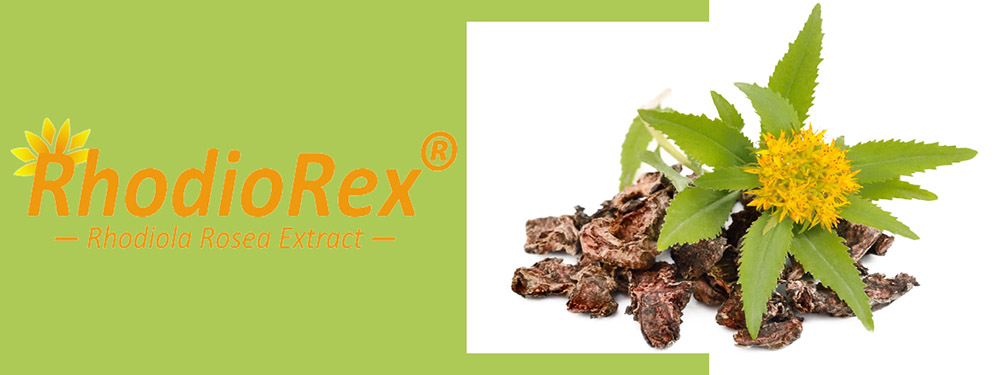Known for more than thousand years, Rhodiola rosea is widely used in the traditional Chinese medicine as an anti-stress in order to stimulate the immune system and an adaptogenic herb. The main components Rosavin and Salidroside are considered responsible for the excellent properties of Rhodiola Rosea.
These statements have not been evaluated by the Food & Drug Administration. This product is not intended to diagnose, treat, cure, or prevent any disease.
♦ Edwards, D., Heufelder, A., & Zimmermann, A. (2012). Therapeutic Effects and Safety of Rhodiola rosea Extract WS® 1375 in Subjects with Life‐stress Symptoms–Results of an Open‐label Study. Phytotherapy Research, 26(8), 1220-1225.
♦ Hung, S. K., Perry, R., & Ernst, E. (2011). The effectiveness and efficacy of Rhodiola rosea L.: a systematic review of randomized clinical trials. Phytomedicine, 18(4), 235-244.
♦ Olsson, E. M., von Schéele, B., & Panossian, A. G. (2009). A randomised, double-blind, placebo-controlled, parallel-group study of the standardised extract shr-5 of the roots of Rhodiola rosea in the treatment of subjects with stress-related fatigue. Planta medica, 75(02), 105-112.
♦ Getova, D. P., & Mihaylova, A. S. (2013). Effects of Rhodiola rosea extract on passive avoidance tests in rats. Central European Journal of Medicine, 8(2), 176-181.
♦ Darbinyan, V., Kteyan, A., Panossian, A., Gabrielian, E., Wikman, G., & Wagner, H. (2000). Rhodiola rosea in stress induced fatigue—a double blind cross-over study of a standardized extract SHR-5 with a repeated low-dose regimen on the mental performance of healthy physicians during night duty. Phytomedicine, 7(5), 365-371.
♦ Spasov, A. A., Wikman, G. K., Mandrikov, V. B., Mironova, I. A., & Neumoin, V. V. (2000). A double-blind, placebo-controlled pilot study of the stimulating and adaptogenic effect of Rhodiola rosea SHR-5 extract on the fatigue of students caused by stress during an examination period with a repeated low-dose regimen. Phytomedicine, 7(2), 85-89.
♦ Spasov, A. A., Mandrikov, V. B., & Mironova, I. A. (1999). The effect of the preparation rodakson on the psychophysiological and physical adaptation of students to an academic load. Eksperimental'naia i klinicheskaia farmakologiia, 63(1), 76-78.
♦ De Bock, K., Eijnde, B. O., Ramaekers, M., & Hespel, P. (2004). Acute Rhodiola rosea intake can improve endurance exercise performance. International journal of sport nutrition and exercise metabolism, 14(3), 298-307.
♦ Shevtsov, V. A., Zholus, B. I., Shervarly, V. I., Vol'skij, V. B., Korovin, Y. P., Khristich, M. P., ... & Wikman, G. (2003). A randomized trial of two different doses of a SHR-5 Rhodiola rosea extract versus placebo and control of capacity for mental work. Phytomedicine, 10(2), 95-105.
♦ Aslanyan, G., Amroyan, E., Gabrielyan, E., Nylander, M., Wikman, G., & Panossian, A. (2010). Double-blind, placebo-controlled, randomised study of single dose effects of ADAPT-232 on cognitive functions. Phytomedicine, 17(7), 494-499.
♦ Sheng, Q. S., Wang, Z. J., Zhang, J., & Zhang, Y. G. (2013). Salidroside promotes peripheral nerve regeneration following crush injury to the sciatic nerve in rats. Neuroreport, 24(5), 217-223.
♦ Darbinyan, V., Aslanyan, G., Amroyan, E., Gabrielyan, E., Malmström, C., & Panossian, A. (2007). Clinical trial of Rhodiola rosea L. extract SHR-5 in the treatment of mild to moderate depression. Nordic journal of psychiatry, 61(5), 343-348.
♦ Bystritsky, A., Kerwin, L., & Feusner, J. D. (2008). A pilot study of Rhodiola rosea (Rhodax®) for generalized anxiety disorder (GAD). The Journal of Alternative and Complementary Medicine, 14(2), 175-180.
♦ McElwee, J. J., Schuster, E., Blanc, E., Piper, M. D., Thomas, J. H., Patel, D. S., ... & Gems, D. (2007). Evolutionary conservation of regulated longevity assurance mechanisms. Genome biology, 8(7), R132.
♦ Partridge, L., & Gems, D. (2002). Mechanisms of aging: public or private?. Nature Reviews Genetics, 3(3), 165-175.
♦ Panossian, A., & Wikman, G. (2009). Evidence-based efficacy of adaptogens in fatigue, and molecular mechanisms related to their stress-protective activity. Current clinical pharmacology, 4(3), 198-219.
♦ Kim, S. H., Hyun, S. H., & Choung, S. Y. (2006). Antioxidative effects of Cinnamomi cassiae and Rhodiola rosea extracts in liver of diabetic mice. Biofactors, 26(3), 209-219.
